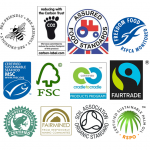Thank you to the Marketing Society for another stimulating evening last night in the company of some great marketing folks. The evening was a ‘showcase’ of some of the Marketing Excellence 2010 award winners, and we had presentations from Waitrose (Grand Prix winners for the Essential Waitrose launch), British Gas (Brand Revitalisation award) and Thinkbox (the relatively new marketing body for commercial TV).
Fascinating though all the presentations were, what stood out to me is that success comes from doing basic good marketing well, plus adapting to the specific challenge. When it comes to marketing, ‘best practice’ is not hard to define, it is implementing it that takes mastery, and these businesses won because they managed to walk the talk not just have lots of meetings and principles that got nowhere.
So here’s my choices of ‘best practice’ gems that I learned from across the three:
1. Accept there’s a problem, quickly: For British Gas it took 20 years, for Waitrose it took a few months, but recognising the issue and putting weight behind solving it is often really hard for a business to do. People often ignore the need to change, and trot out trite pacifisims rather than face the truth (‘if it ain’t broke don’t fix it’) or there is simply a culture of ‘managing decline’ (British Gas) rather than challenging the norm and going for growth.
2. Set a clear mission: Not just a vision for how things should be, but a powerful mission that galvanises the team – measurable, actionable, and with a sense of urgency that if this isn’t solved, the world will end as we know it. Nothing like a fire under you to get you moving. Again, this is about culture – Waitrose recognising that the economic crisis meant people were going to shop elsewhere, even though they love Waitrose, and Thinkbox recognising that they had a limited window to shift poor attitudes to TV advertising before it became too entrenched.
3. Put insight at the heart, bravely and completely: Easy to say, hard to do. What impressed me was that all the businesses used different methods to do it. British Gas did a full quantitative segmentation of customer needs (a first for the business), whereas Thinkbox used PWC to do a large econometric study to identify the impact of TV advertising. Most interesting was the total commitment to insight – both were big expensive studies, and then British Gas went one step further and actually set up a consumer panel of 40 customers who were invited in to the offices to meet different parts of the business and review practices and help identify what was wrong from the customer point of view. How brave is that?!
4. Use insight to create a compelling Big Idea: All 3 winners had clear impactful brand strategy that really crystallised what the brand was about, in an emotionally engaging way, and so obviously came from the insight. As British Gas said, their previous focus on ‘energy expertise’ was a ‘so what?’ to customers, but the new brand idea based on ‘your home is your world, British Gas will look after it’ was far more compelling, and provides a long term platform to grow regardless of the specific campaign or proposition at any one time.
5. Focus on engaging people: For British Gas; engaging all the different silo’d parts of the business in the new mission required patience and time commitment, and reassuring the board to have patience while the campaign built momentum. For Thinkbox; winning over the critics of the media agency planners and journalists, and using their well researched data to turn the tide of opinion. And for Waitrose; engaging internally for staff to ‘hold their nerve’ while the press and public got over their initial confusion or suprise at the Essentials launch – which of course then has turned into a booming success but took months.
6. Evaluate wisely: For all businesses, they had decided what measures they really wanted to move at the start, and put in place ways to measure them. The results were astounding for all 3, in terms of their chosen indicators across sales, brand image measures, and return on investment, and enabled them to critically evaluate effectiveness (to achieve what they needed) not just efficiency.
There was of course a great deal more richness in each case study, but thanks again to Andrew Hogan (British Gas), Lindsey Clay (Thinkbox) and Sarah Fuller (Waitrose) for a thought provoking evening. It was a solid reminder that great marketing isn’t rocket science, but it does come from doing the basics with commitment, inventiveness and brilliance, not just ticking boxes.



